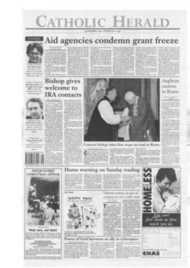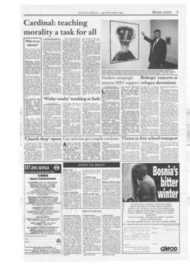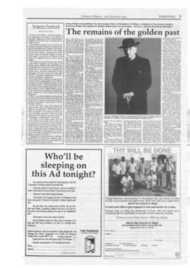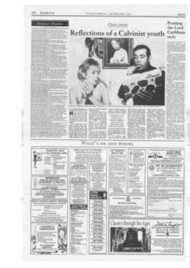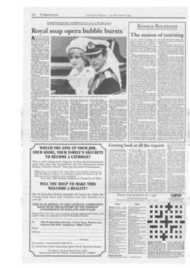Page 9, 3rd December 1993
Page 9

Report an error
Noticed an error on this page?If you've noticed an error in this article please click here to report it.
Tags
Share
Related articles
Gilbey's Literary Selection Wows The Tory Top Brass
The Old Man Of The Century
Charterhouse Chronicle By Glenys Roberts
`he Had More Effect On The Growth Of The Church In These...
Mgr Gilbey — A Poet From Another World
Glenys Roberts has published The Commonplace Book of Monsignor A
N Gilbey, a collection of the eminent prelate's favourite writings. She explains to Cristina Odone about her fascination and ours with the 92-year-old Monsignor
The remains of the golden past
LIKE A CHARACTER Out Of a Merchant Ivory film, the frail elderly monsignor sits at a table in his club, chin cupped in hand, eyes misty as he stares at the remains of the day. A flock of foppish young men fuss around his frockcoated figure, vying with the Jeews-like waiter for his attention.
This, you feel, is no ordinary prelate. Certainly not: Mgr Alfred Gilbey has achieved mythological status, with his unflinching championing of a pre-Vatican II Church and of a turn-of-thecentury England. At 92, Mgr Gilbey (whose title since 1965 is Protonotary Apostolic) is a flesh-and-blood history book, a relic of a golden era.
Our fascination with Mgr Afred Gilbey goes above and beyond his longevity, though: in a world of constant change, where morality is consigned to the flotsam and jetsam of cultural trends and politically correct mottos, where horrors like the James Bulger murder shake up our value system and urge us to question our notion of progress, this priest emerges like a spiritual Rock of Gibraltar.
Immutable, intransigent, he points to the way we were and asks out loud whether our socalled progress has improved our lives. His vibrant voice ringing in the hallowed halls of the Travellers' Club, the Monsignor will share this vision of time lost with the select band of his disciples.
Chief among the apostles is columnist Glenys Roberts, whose unstinting admiration for the prelate led her to collect his favourite works, quotations, and bon mots in The Commonplace Book of Mgr AN Gibey.
What was originally meant as a birthday present has now become a publishing hot-cake, snatched off the shelves before you can say Christmas.
Theirs is a strange love story: a fire-in-the-belly journalist, divorced and a mother of one, and a 92-year-old prelate who loves beagling and believes a woman's place is in the house. An odd couple, certainly. Yet ever since Glenys Roberts first sported the black figure in a frock coat crossing her Cambridge quad, she knew Mgr Gilbey held the secret to the good life in his hands.
At the dawn of the 60s, Mgr Alfred Gilbey was already spoken of as a fleshand-blood relic of another era: Catholic Chaplain to the university (a post he filled for 100 terms, from 1932 to 1965), a keen Trinity Foot Beagler who could be seen running after hares on the Northumberland hills, a berretta-topped Waugh-like vision surrounded by handsome and blue-blooded undergraduates.
To Glenys a nonCatholic self-styled feminist from a modest terraced house, grappling with a typically undergraduate existential crisis the Monsignor personified class, Catholicism and the appeal of certainty.
He still does. Though they did not meet again until a quarter of a century later, Gilbey had retained his ability to fill Glenys now a successful journalist, divorced, and with a daughter with awe. "Mgr Gilbey's main attraction is an uncanny clarity of mind. It probably comes from holding the same unflinching beliefs for a lifetime and it is very evident if you read his first book, We Believe, in which, as he puts it, he expounds the teachings of the Catholic Church in Faith and Morals."
In our transient world, Mgr Gilbey remains, reassuringly, an absolutely fixed point. Glenys calls this "fascinating", especially since "today you do not find it in family life, not at school, not in any area of society. The fact that you cannot change his mind, no matter what you say, is tremendously reassuring."
If Glenys regards the Monsignor as her moral tutor, and their spiritual collaboration as a reversed-gender Dante and Beatrice, she does acknowledge that for many, within and without the Church, Gilbey is reactionary with a capital R. This is, after all the priest who turned away female undergraduates from his Cambridge Chaplaincy because "they were a different thing".
"He deplores the changes in the Church since Vatican II," Glenys admits. "He obtained special permission to celebrate the Tridentine Rite" (and some say the monsignor celebrates Mass in his abode — a set of rooms at the Travellers' Club in Pall Mall.) "The way I interpret his view of the Church," Glenys explains, "is that it is an ideal for human behaviour. If you lower that ideal, there is no point. And I must say I agree with him: you shoot for the moon and you might get the stars."
If Mgr Gilbey's view of the Church is unrepentantly preVatican Et, his attitude towards secular society is positively Edwardian not perhaps surprising in the product of a privileged background that included estates, wealth (Gilbey's Gin), and noble stock. Yet Glenys found that even this autocratic world order held an appeal to her: "I once described England as trapped between Buckingham Palace and the dole — not knowing whether to look to the old order or the new. I thought the country was frustrated by this identity crisis. One of my reasons for publishing the Commonplace Book, which is about the old order which Mgr Gilbey remembers so well, was to understand exactly what we were throwing away."
The goal Everyman moves towards is happiness, Aristotle taught. Yet Glenys feels that "People are not very happy. Indeed, there is no evidence that they are any happier than they used to be. Whereas, the moment you are in the company of Mgr Gilbey, you feel his aura of contentment., I thought: Joe Smith in the street will be curious about what makes this man succeed — without giving up the good life, Mgr Gilbey has attained true serenity."
The Mgr Gilbcy recipe for enjoying life stresses the importance of faith: faith in a Divine Providence that looks out for us, and forges our destiny. The happy man accepts everything that comes his way, because he knows that he must do nothing other than take what is destined for him. He must, in Catholic terms, make the leap of faith.
If you can affect the incidentals, but not the substance in your life, as Mgr Gilbey preaches, you are active without being anxious, you yield to the Great Force without being fatalistic.
For Glenys Roberts, at least, this philosophy has worked: "Once you agree to trust, to hand over the reins, you cannot but be content."
The secret to reaching this state of mind lies in prayer: "He always said to me, just pray, Glenys, pray. He gave me a book of prayers, and my favourite is a beautiful one called 'Fifteeen Minutes Before the Communion Service'." Their collection for the Commonplace Book features only one prayer, George Herbert's 'Teach Me My God and King'. The other excerpts add up to a smorgasbord of secular and spiritual offerings from GK Chesterton to George Santayana, from Maisie Ward to Charles Dickens.
When Glenys first met Mgr Gilbey in their Cambridge days, he told her she would convert to Catholicism though not vet. I ask her if she has taken the big step she shakes her head. "But in the end," she smiles, "I always do as he prophesises..."
blog comments powered by Disqus


